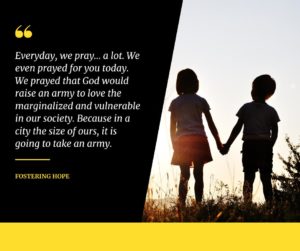I Understand
Do you ever have encounters that you cannot shake? You continually offer it up to the Lord, but the awkwardness of the exchange lingers, and you get stuck trying to make sense of it all. I recently had a conversation with a youth leader that still makes my stomach turn, even months later. I had spent months wondering how my oldest son, Nolan, who struggles socially, has been adjusting to the much larger and louder culture of our church’s middle school youth group. When I had an opportunity to speak to the leader away from Nolan’s listening ears, I jumped at the chance.
I asked how he was fitting in and explained that I feared he could be easily picked on. The leader nodded agreeably and said there was no bullying in the group. In the midst of my breathing a heavy sigh of relief, he quickly followed with, “They pretty much ignore him.” It came across as though it was meant to be reassuring.
I immediately looked to the sky, to give the illusion I was in deep thought. I suppose it was not an illusion, as I did have many thoughts I desired to share. It was intentional on my part, as I feared that, even though I was literally biting my tongue, the rest of my face would convey the message I was not allowing my mouth to share. Thinking before speaking has never been a spiritual gift, so I stood there, dodging anymore eye contact. No other words were added to the exchange, as I gathered my flock and herded them towards our passenger van. On the way home, I acknowledged that my son was not the only one awkwardly navigating interactions with the middle school leadership. It ran in the family.
Being a special needs parent really sharpens a person’s advocacy skills. If being an advocate was equivocated to knives, we would be Ginsus. We are razor sharp. It was time to put those skills to the test. But I quickly realized that there was no easy answer to this problem. What was I going to do? Make a morning announcement while the kids were all eating donuts that my son is precious and made perfectly by God and he should be treated like the coolest kid in the bunch? Who else could tell you how many pieces are in any given Lego set? He has amazing skills. Which you would know if you ever spoke to him. On second thought, this route seems the opposite of helpful. I would probably need to send him pre-wedgied to the next gathering.
And even though I can speak of some of my thoughts with humor, my heart remained grieved as the days and weeks went on. I would be going about my day, and the statement was right there in my head again. I kept placing it in God’s hands, as I had already determined it was not my battle to fight. Still it came back, almost daily. I knew, it was time to find the joy in this horrendous comment. I started recalling how many lives Nolan had touched and how he had helped people to see Autism differently. I thought about how he had made everyone more compassionate and understanding. How being comfortable with Autism had led us to foster care. But I found a recurring theme: he made Us better, he made Us more compassionate, he made Us more comfortable. He had bettered us, but it was not a betterment for him. Tears began to flow as I shared the conclusion with God. My son being ignored by people he considered his closest friend brings me no joy.
And God said something so beautiful to my broken heart. “I understand.”
That is true. You do understand what it feels like to have your son ignored by people he thought were friends. God knows that on a much deeper level then I could ever begin to imagine. A solution was not the answer, but rather remembering I was not alone. Jesus experienced and witnessed more sorrow than any other man who has ever existed. There is no hurt or heart break that we cannot lift to him.
As I thanked God for this reminder, I was so grateful that I am never alone in my heartbreak, or my fear, or my anxiety, or my joy. His word does not promise us that we will not ever be ignored by people we love, but we know that we are never ignored by our Heavenly Father. He will never leave us or forsake us. This we can always rejoice in.
Amen

 Could it be you?
Could it be you?


